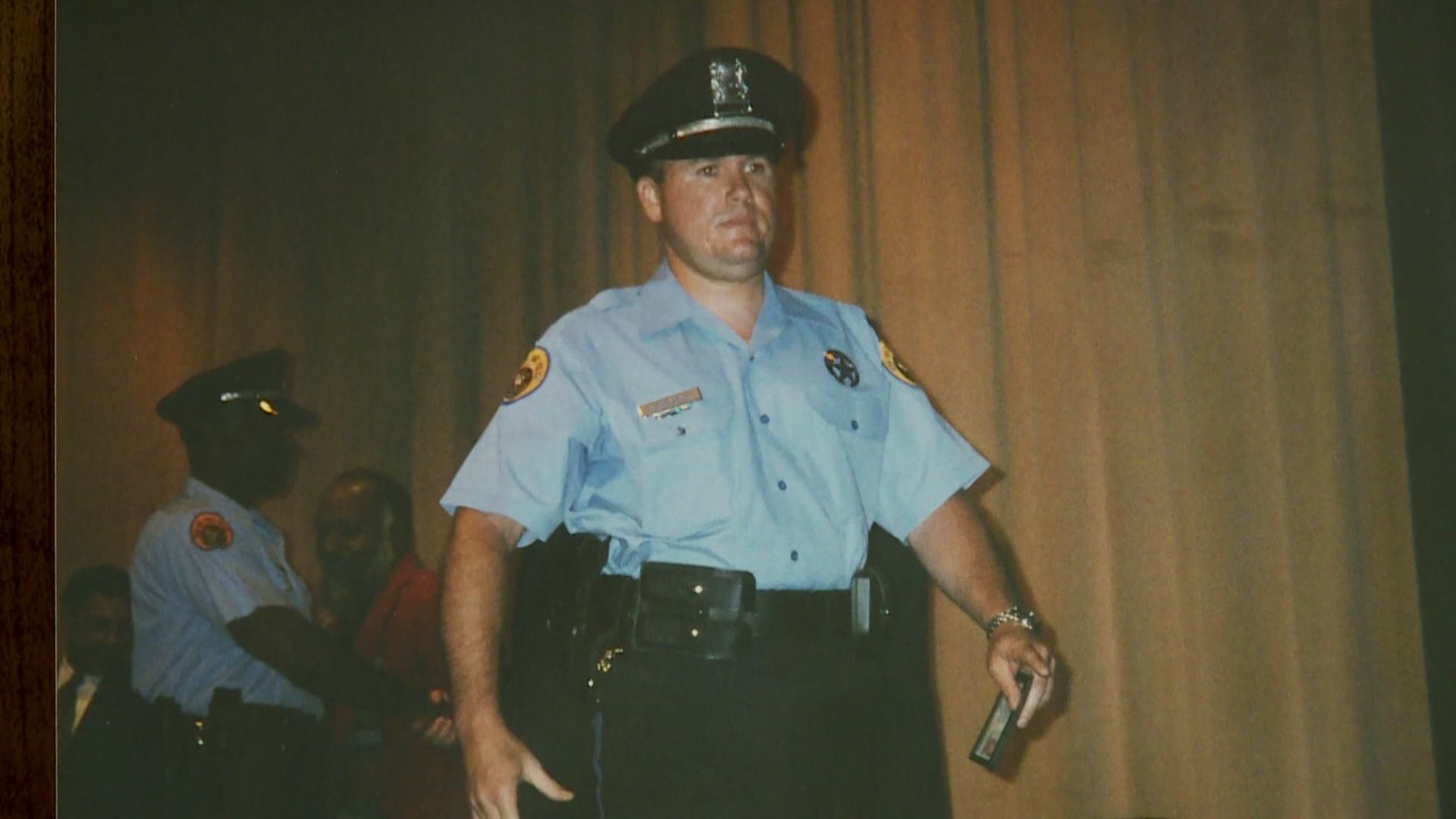NEW ORLEANS — “Blindsided. Hit hard. Shocked.”
That was how Dorothy Tardy described her reaction after getting a call from Angola State Penitentiary that inmate Michael Davis was being released nearly 19 years after he was convicted in the barroom robbery that led to her son’s death.
Officer Christopher Russell was shot and killed before he could even get out of his squad car. He and his partner were responding to the 2002 gangland-style robbery of Club Tango in the 9th Ward in which 16 people in the bar were forced by four to strip at gunpoint and surrender their belongings.
“Jewelry, money taken. Forced to strip. Piled in a bathroom almost on top of each other,” Tardy recalled. “Maybe I'll wake up tomorrow and it was just a nightmare.”
The reality is that Davis, one of the four defendants, is now free. After originally given life plus 198 years for the armed robbery and as a four-time multiple offender, that sentence was thrown out because Davis was convicted by a non-unanimous verdict, 11-to-1. Split juries are now illegal in Louisiana after a 2018 referendum ended the Jim Crow-era rule.
The man who shot Officer Russell in the face, Dwight Patterson, was convicted of first-degree murder and is still serving a life sentence. Two other men pleaded guilty in the case to armed robbery and were sentenced to 15 and 25 years.
Davis' conviction was among the hundreds of non-unanimous jury verdicts being appealed since the U.S. Supreme Court ruled last year that Louisiana's Jim-Crow era law allowing such verdicts was unconstitutional.
But Davis' reversal was not mandatory. While the Supreme Court is still deciding if its ruling should be retroactive, newly elected District Attorney Jason Williams announced in February that he was moving ahead on 22 cases, included Davis's.
“For too long, New Orleans has simply been ground zero for unfairness,” Williams announced at a press event on the courthouse steps to announced the reversals in what he called the “Jim Crow Jury Project.”
Williams’ program matches campaign promises he made to put the DA’s office on a fast track toward criminal justice reform. But reform can be met with sharp questions and heavy emotions from crime victims and their families, and that’s just what happened in the Davis case.
“So essentially the DA's office has become a de facto commutation board,” said Rafael Goyeneche, president of the Metropolitan Crime Commission, a criminal justice watchdog group. “They had it within their power to do something about that sentence and they did nothing.”
Orleans Criminal Court Judge Nandi Campbell accepted a new guilty plea from Davis on April 1 and gave him an 18-year sentence. One of the robbery victims testified at the hearing, but officer Russell's family was never notified.
Goyeneche said the family should have been heard, especially since they gave victim impact statements at Davis’ original sentencing more than a decade ago.
“She was ignored. She wasn't even on their radar screen to contact them. It's inexcusable,” he said.
Since Davis’ release and the Russell family’s outcry, a flurry of calls have been made behind-the-scenes, revealing the delicate dynamics and raw nerves in this case. Some of those calls were between Tardy and Police Chief Shaun Ferguson.
“Chief Ferguson called me back and he said, ‘Ms. Tardy, I got your message. I don't quite understand.' He had not been notified, ” she recounted.
Donovan Livaccari, attorney for the Fraternal Order of Police, said some fence-mending is in order in the Davis case to ensure a strong line of communication between police and prosecutors.
“There certainly has to be a working dialogue between the district attorney's office and the police department,” Livaccari said.
Another significant call came to Tardy minutes after WWL-TV interviewed her. It came from the DA's office. Tardy said she is still deciding whether to accept the office’s invitation to meet.
A spokesman acknowledged that call, and also issued a lengthy statement from the DA.
“We certainly understand the pain of this mother. And, we all are bearing the burden, pain and consequences of a criminal legal system that has failed this community,” Williams’ statement reads.
The statement continues, “Let me be clear – Dwight Patterson, who murdered NOPD Officer Christopher Russell on August 4, 2002 – is and will continue to serve life for that first-degree murder. And, anyone who murders a police officer, or anyone in this city, will absolutely be held accountable for their actions.”
As for the Davis case, Williams stated, “Davis went to trial solely for the charge of armed robbery and was convicted by a non-unanimous jury. He was sentenced to natural life – the exact same amount of time Patterson received for the murder of Officer Russell, yet vastly more than the sentences of those who committed the same crime he was tried for.”
“Like hundreds of other citizens convicted by the unfair non-unanimous juries, Davis applied for post-conviction relief. As part of our Undoing Jim Crow Juries Civil Rights Initiative, our office is required to review the case and determine the most appropriate way to re-visit the case. We vacated the charge against Davis and he plead guilty to the exact same charge that he was given.”
“The non-unanimous verdict in this case was an injustice not only to the defendant and jurors, but also to the victims and people of New Orleans,” the statement continued.
Not only was Davis released, but his new address is just a couple of miles from where Officer Russell's widow lives with the two children who never knew their father. The family is struggling with how much to tell the kids. The youngest, a son born six months after the murder, is about to graduate high school.
“It's just unbelievable,” Tardy said. “Justify that to me, the officer's mother. Tell me how I am supposed to accept that my son was ripped from his family and now you're saying, well, it's OK?”

